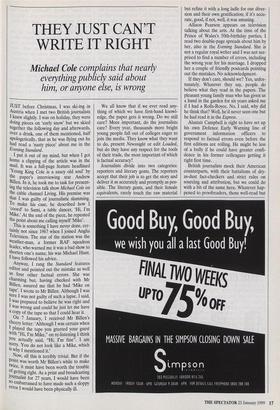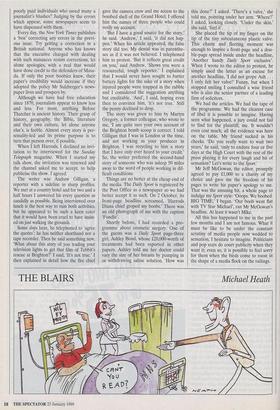THEY JUST CAN'T WRITE IT RIGHT
Michael Cole complains that nearly
everything publicly said about him, or anyone else, is wrong
JUST before Christmas, I was ski-ing in Austria when I met two British journalists I knew slightly. I was on holiday, they were doing pieces on 'early snow' but we skied together the following day and afterwards, over a drink, one of them mentioned, half apologetically, that as he was flying out he had read a 'nasty piece' about me in the Evening Standard.
I put it out of my mind, but when I got home a clipping of the article was in the mail. It was a full-page feature headlined Young King Cole is a saucy old soul' by the paper's interviewing star Andrew Billen. In it, he took me to task for present- ing the television talk show Michael Cole on the cable channel Living. His premise was that I was guilty of journalistic slumming. To make his case, he described how I cooed' to Sami, a table dancer, 'Hi, I'm Mike.' At the end of the piece, he repeated the point about me calling myself 'Mike'. This is something I have never done, cer- tainly not since 1967 when I joined Anglia Television. The star of the station was the weather-man, a former RAF squadron leader, who warned me it was a bad show to shorten one's name; his was Michael Hunt. I have followed his advice.
Anyway, I rang the Standard features editor and pointed out the mistake as well as four other factual errors. She was charming but, having checked with Mr Billen, assured me that he had 'Mike on tape'. I wrote to Mr Billen. Although I was sure I was not guilty of such a lapse, I said, I was prepared to believe he was right and I was wrong and could he just let me have a copy of the tape so that I could hear it. On 7 January, I received Mr Billen's cheery letter: 'Although I was certain when I played the tape you greeted your guest with "Hi, I'm Mike," on re-listening I think You actually said, "Hi, I'm fine". I am sorry. You do not look like a Mike, which is Why I mentioned it.'
11.0w, all this is terribly trivial. But if the point was worth Mr Billen's while to make twice, it must have been worth the trouble Of getting right. As a print and broadcasting Journalist for 27 years, I would have been so embarrassed to have made such a sloppy error I would have been physically ill. We all know that if we ever read any- thing of which we have first-hand knowl- edge, the paper gets it wrong. Do we still care? More important, do the journalists care? Every year, thousands more bright young people fall out of colleges eager to join the media. They know what they want to do, present Newsnight or edit Loaded, but do they have any respect for the tools of their trade, the most important of which is factual accuracy?
Journalists divide into two categories: reporters and literary gents. The reporters accept that their job is to get the story and deliver it as accurately and promptly as pos- sible. The literary gents, and their female equivalents, rarely touch the raw material but refine it with a long ladle for our diver- sion and their own gratification; if it's accu- rate, good, if not, well, it was amusing. '
Allison Pearson appears on television talking about the arts. At the time of the Prince of Wales's 50th-birthday parties, I read two double-page spreads about him by her, also in the Evening Standard. She is not a regular royal writer and I was not sur- prised to find a number of errors, including the wrong year for his marriage. I dropped her a couple of friendly postcards pointing out the mistakes. No acknowledgment.
If they don't care, should we? Yes, unfor- tunately. Whatever they say, people do believe what they read in the papers. The pleasant young family man who has given us a hand in the garden for six years asked me if I had a Rolls-Royce. No, I said, why did he think that? Well, he'd never seen one but he had read it in the Express.
Alastair Campbell is right to have set up his own Defence Early Warning line of government information officers to respond to factual errors even before the first editions are rolling. He might be less of a bully if he could have greater confi- dence in his former colleagues getting it right first time.
British journalists mock their American counterparts, with their battalions of dry- as-dust fact-checkers and strict rules on sourcing and attribution, but we could do with a bit of the same here. Whatever hap- pened to proofreaders, those well-read but poorly paid individuals who saved many a journalist's blushes? Judging by the errors which appear, some newspapers seem to have dispensed with them.
Every day, the New York Times publishes a 'box' correcting any errors in the previ- ous issue. Try getting a correction in a British national. Anyone who has knows that the executive charged with dealing with such nuisances resists corrections, let alone apologies, with a zeal that would have done credit to the defenders of Masa- da. If only the poor boobies knew, their paper's credibility would increase if they adopted the policy Mr Sulzberger's news- paper lives and prospers by.
Although we have had free education since 1870, journalists appear to know less and less. For most, anything Before Thatcher is ancient history. Their grasp of history, geography, the Bible, literature and their own culture, let alone anyone else's, is feeble. Almost every story is per- sonality-led and its prime purpose is to turn that person over, if possible.
When I left Harrods, I declined an invi- tation to be interviewed for the Sunday Telegraph magazine. When I started my talk show, the invitation was renewed and the channel asked me to accept, to help publicise the show. I agreed.
The writer was Andrew Gilligan, a reporter with a sideline in sharp profiles. We met at a country hotel and for two and a half hours I answered his every question as candidly as possible. Being interviewed over lunch is the best way to ruin both activities, but he appeared to be such a keen eater that it would have been cruel to have insist- ed on just walking the grounds.
Some days later, he telephoned to 'agree the quotes'; he has neither shorthand nor a tape recorder. Then he said something new, `What about this story of you trading your television lights to get that film of Tebbit's rescue at Brighton?' I said, 'It's not true.' I then explained in detail how the fire chief gave the camera crew and me access to the bombed shell of the Grand Hotel; I offered him the names of three people who could verify my account.
`But I have a good source for the story,' he said. 'Andrew,' I said, 'it did not hap- pen.' When his article appeared, the false story did too. My denial was in parenthe- ses as if it was not believed. I telephoned him to protest. 'But it reflects great credit on you,' said Andrew. 'Shows you were a resourceful, tough reporter.' I explained that I would never have sought to barter battery lights for the sake of a story when injured people were trapped in the rubble and I considered the suggestion anything but creditable. 'And', I said, hoping even then to convince him, 'it's not true.' Still the penny declined to drop.
The story was given to him by Martyr). Gregory, a former colleague, who wrote to me, 'I am quite sure your own account of the Brighton bomb scoop is correct. I told Gilligan that I was in London at the time, and not working as your producer in Brighton. I was recycling to him a story that I have only ever heard to your credit.' So, the writer preferred the second-hand story of someone who was asleep 50 miles away to the word of people working in dif- ficult conditions.
Things are no better at the cheap end of the media. The Daily Sport is registered by the Post Office as a newspaper so we had better accept it as such. On 2 October, its front-page headline screamed, 'Harrods Diana chief groped my boobs.' There was an old photograph of me with the caption `Fondle'.
Shortly before, I had recorded a pro- gramme about cosmetic surgery. One of the guests was a Daily Sport page-three girl, Ashley Bond, whose £20,000-worth of treatments had been reported in other papers. Ashley told me her doctor could vary the size of her breasts by pumping in or withdrawing saline solution. 'How was this done?' I asked. 'There's a valve,' she told me, pointing under her arm. 'Where?' I asked, looking closely. 'Under the skin,' she said, 'feel it'.
She placed the tip of my finger on the tip of the tiny subcutaneous plastic valve. This chaste and fleeting moment was enough to inspire a front-page and a dou- ble-page spread inside under the headline, `Another handy Daily Sport exclusive'. When I wrote to the editor to protest, he simply used the letter as an excuse for another headline, 'I did not grope Ash .
I only felt her valve!' Funny, but when I stopped smiling I consulted a wise friend who is also the senior partner of a leading firm of solicitors.
We had the articles. We had the tape of the programme. We had the clearest case of libel it is possible to imagine. Having seen what happened, a jury could not fail to find for the plaintiff, me. It wouldn't even cost much; all the evidence was here on the table. My friend sucked in his cheeks. 'Do you really want to wait two years,' he said, 'only to endure four or five days at the High Court with the rest of the press playing it for every laugh and bit of sensation? Let's write to the Sport.'
Mr Jeff McGowan, the editor, promptly agreed to pay £1,000 to a charity of my choice and gave me the freedom of his pages to write his paper's apology to me- That was the amusing bit, a whole page to indulge my Sport style: 'Ooops. We boobed. BIG TIME,' I began. 'Our boob went flat with TV Star Michael', ran Mr McGowan's headline. At least it wasn't Mike.
All this has happened to me in the past few months and I am not famous. What it must be like to be under the constant scrutiny of media people now wedded to sensation, I hesitate to imagine. Politicians and pop stars do court publicity when they want it; even so, it is possible to feel sorry for them when the birds come to roost in the shape of a media flock on the railings.



























































 Previous page
Previous page